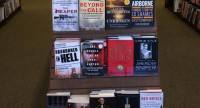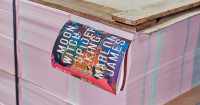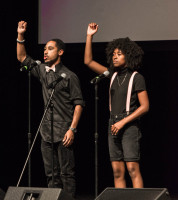
So you want to write a book? Part 2: Agents, queries and timelines
niemanstoryboard.org – Thursday February 24, 2022

You’ve written that gripping long-form story, and you’re champing at the bit to get a book deal. What do you do?
My own journey started with a lot of wrong turns and even more learning, which I wrote about in Part I of this mini-series. But it finally got my first book, “The Spy’s Son,” onto bookshelves. It tells the true story of the highest-ranking CIA officer ever convicted of espionage, and how he recruited his son to follow in his spy steps.
Contracts for other books followed. And later this year, “The Spy’s Son” is coming out as a TV-and-streaming docuseries.
Here is my go-to advice about the four essential things you need to do, and how to build a timeline to support that work.

So you want to write a book? Part 1: Have a strong story and resilient ego
niemanstoryboard.org – Wednesday February 23, 2022

ll the great writers have proffered wisdom on the craft, the best-in-show quote being Norman Mailer’s: “Writing books is the closest men come to childbearing.” But the literary sages have offered scarce advice to serious long-form journalists on plotting, writing and, most importantly, selling a nonfiction book
So for now, you’re stuck with moi.
Look, m’friends, if a lunch-bucket journalist like me can do it, so can you. All you need is endurance (maximized by a 14-cup coffee maker), great story organization skills, a boatload of time (and the tolerant family that comes with it), the power to shrug off rejections and monophobia, the guidance of a good literary agent, and a smidgen or two of pure damned luck.
Here are six things to consider as you begin your quest to write a nonfiction book.

How a Book Is Made
nytimes.com – Sunday February 20, 2022

Have you ever wondered how a book becomes a book? Join us as we follow Marlon James’s “Moon Witch, Spider King” through the printing process.
It started as a Word document, pecked out letter by letter at a dining room table in Connecticut.
Now, it is 150,000 copies of a 626-page book called “Moon Witch, Spider King,” with a luminous cover that glows with neon pinks and greens.
While digital media completely upended industries like music, movies and newspapers, most publishers and authors still make the bulk of their money from selling bound stacks of paper.

A Word, Please: Seven deadly adverbs to avoid in your writing
latimes.com – Wednesday February 16, 2022

Adverbs are great, right? They let you describe how an action went down — whether it was walking quickly or sleeping soundly or yelling loudly.
But if adverbs are so great, why do editors like me spend a good chunk of our time hacking and slashing them out of articles, stories and other written works? Answer: Because the adverbs you know and love — those dynamic little words with the cute -ly tails — aren’t as benevolent as you think. Some can undermine your message and cast doubt on your credibility. Below we’ll look at seven deadly adverbs to avoid. But first, a few important points.

We don’t need more literary magazines
spectatorworld.com – Tuesday February 15, 2022

At CNN, Leah Asmelash laments the demise of many “long-standing” literary magazines. “The Believer,” she writes, which was started in 2003, “was once at the top of the literary magazine game. A leading journal of art and culture, the Believer published the work of icons like Leslie Jamison, Nick Hornby and Anne Carson. It won awards, it launched careers.” But the University of Nevada, which has housed the magazine since 2017, announced that it was shutting it down: “In a statement explaining the decision, the dean of the school’s College of Liberal Arts called print publications like the Believer ‘a financially challenging endeavor.’”
Oh, boy. Leslie Jamison, an icon? The Believer, a publication that “launched careers”? The only thing missing here is some theme music and a “CNN exclusive” or two.
Asmelash goes on to write about a handful of literary magazines housed at universities with MFA programs that are also shutting down — the Alaska Quarterly Review and the Sycamore Review, among others. We get the predictable “It wasn’t always this way” about halfway through:

Valentine’s Day: Four authors share their thoughts on writing romance
belfasttelegraph.co.uk – Sunday February 13, 2022

With romantic fiction sales increasing 49% last year, just what is it about these tantalising tales that set our hearts ablaze?
Mills & Boon author Lynne Graham believes happy endings are one of the reasons why the romance genre remains so popular. Penning love stories helped the Ballymena-based author to achieve her very own happy ending when she used her first book payment for a special purpose.
“My first advance paid for us to go out to Sri Lanka, where we adopted two of our children,” Lynne says.
“I had a 10-year-old daughter at the time. It felt like a miracle that the cheque arrived at that moment and it was sufficient to cover the travel expenses, so I’ve never forgotten it.”
The mum-of-five is the bestselling Mills & Boon Presents author, with sales of 42 million worldwide.

“I do not think it is a good story.” Never ask Charles Dickens for writing advice.
lithub.com – Tuesday February 8, 2022

Today marks the 210th birthday of Charles Dickens—novelist, critic, and, from 1859 until his death, editor of a weekly literary journal called All the Year Round. As literary journal editors will presumably understand, the responsibilities stressed him out to the point of dispensing with politeness. We know this because when Dickens’s friend Captain Frederick Marryat’s daughter Florence submitted a piece and asked him for writing advice, he roasted her to hell for even asking for feedback:

Does the feedback in creative writing workshops make for better writing?
whyy.org – Sunday February 6, 2022

When Yi Wei was a young child, she would write down snippets of English conversations and phrases she heard while watching television. And soon this practice followed her to her early classrooms, where her written responses in her schoolwork would come in fragmented sentences.
“At the time my teachers would be like, ‘Oh, this is a poem.’ And it was because when I was growing up, I kinda learned to speak through the TV.”
Wei is a Chinese immigrant, and she said this is an experience she shares with many immigrants in the United States. She has been writing for years, and now she’s a graduate student in New York University’s poetry MFA program. But Wei didn’t begin writing poems until high school. And she says there was little opportunity for feedback, with the exception of small, informal writing groups she started with close friends.

How to Read a Play as a Manual for Novel Writing
lithub.com – Saturday February 5, 2022

Several years ago, I ran into a neighbor—a fiction writer and essayist—in a coffee shop, where he was reading Harold Pinter’s The Dumbwaiter. “I like to read plays before I write fiction because they remind me how to start writing,” he said.
At the time, I didn’t understand what he meant—I thought the prose I wrote and the plays I wrote were diametrically opposed. I teach playwriting to undergrads, and I tell my students early and often that a play has more in common with a song or a poem than with a novel. In playwriting groups it’s often a veiled insult to be told that your plays are “novelistic”—that’s when you know your play is overwritten and not theatrical. I always thought if I wanted to write a novel—which I did—I had to push what I knew about playwriting away: that other than both being made up of words the two forms were at best distant, and at worst, incompatible.
In March 2020, when I had a big theatrical project postponed indefinitely, I began working on the novel that would become my debut. From the start, I could tell there was something different about my writing, something that excited me—it had an energy, a voice. Once I finished the first chapter, I knew I could keep going. And as I continued to write Vladimir, the story of an English professor’s captivation with a younger colleague, I realized that I was pulling directly from what I knew about playwriting. Here are three aspects I considered:

Identity politics is killing fiction
spiked-online.com – Thursday January 27, 2022

Should authors really feel compelled to write only from their own personal experience as a member of a particular identity group? Or are the current obsessions with authenticity and identity in danger of disfiguring literature completely?
This is not a hypothetical question. For instance, author Sebastian Faulks recently declared that he would stop describing the appearance of female characters. He was responding to criticism from a reader who challenged his ‘right [as a man] to write about a woman’.
This growing wariness over the freedom of a writer to imagine his or her way into a character has coincided with the rise of ‘autofiction’ (short for autobiographical fiction). This genre gathers under its umbrella a flattering range of literary figures, from Sheila Heti and Ben Lerner to Karl Ove Knausgård. It aims to provide a sense of real human experience.
Get the free newsletter | Submit a news item or article | Get Writers' News for your website





